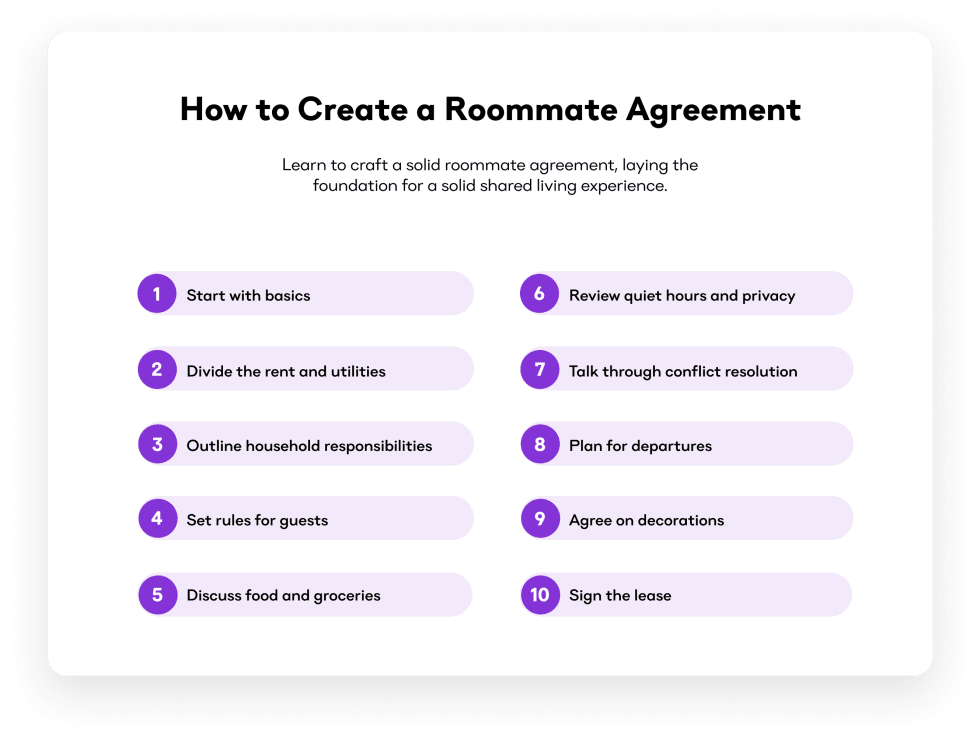South Bank at Quarry Trails
- 93 units available
- Studio • 1 bed • 2 bed • 3 bed
- Amenities
In unit laundry, Patio / balcony, Granite counters, Pet friendly, Stainless steel, Walk in closets + more

Living with roommates can be an incredible experience that results in lifelong friendships. But good professional relationships where each roommate meets their obligation to one another is key to that connection. Figuring out a way to split rent seamlessly will ensure that your personal relationships have the best possible foundation.
Though splitting rent with roommates can be simple and straightforward, it's not always the case. For example, you may find yourself renting with a couple or within an apartment with significantly different sized bedrooms.
When these situations occur, things can get complicated. Luckily, this guide will break down everything you need to know about splitting rent with roommates in various situations.

Splitting rent by bedroom is a relatively common practice due to its simplicity. To split rent by bedroom, you’ll need to divide the rent price by the number of bedrooms in the unit. Each person residing in a bedroom will need to cover the rent for that space.
For example, let’s consider an apartment with four bedrooms and four individual renters occupying a separate room each.
If the rent for your unit is $4,000 a month, each renter would be responsible for paying $1,000 in rent each month.
This can be a similar but unfair approach, depending on the circumstances.
What if there are more renters than bedrooms in the unit? Do the people sharing rooms pay more or less in rent?
When there are more roommates than bedrooms, roommates who share a bedroom may pay half of what the other roommates pay. In this instance, you’ll have to communicate with your roommates to figure out a solution that everyone feels is fair.
If you find that you’re covering a larger portion of the rent than feels fair, you might discuss modifying the rent splitting agreement. For example, when there are more roommates than bedrooms, it might be best to split rent by person rather than by bedroom.
You’ll have to discuss this with your roommates and come to a conclusion before formalizing the arrangement via a physical agreement.

This rent-splitting option is ideal for apartment units with bedrooms that greatly differ in size. While a single bedroom may be able to fit a king-size bed comfortably and have an en-suite bathroom, another might be about the size of Harry Potter's cupboard.
In this case, it's common to divide the cost of rent by the square footage (sqft) of each bedroom. This is a little trickier as it requires you to know each bedroom’s square footage and some slightly more complex math. However, you can ask your landlord about the square footage of each bedroom to help you get started.
To divide rent by the square footage of each bedroom, you’ll need to use the following equation:
(Your Bedroom’s sqft/Total sqft of all Bedrooms) x (Total Rent) = Your Rent Portion
To show what this would look like in action, we’ll use the example of a $2,100 a month two-bedroom apartment with a master bedroom and a smaller bedroom. In this example, you drew the short straw and are stuck with the smaller bedroom.
Let’s say the master bedroom is 280 sqft, including an en-suite bathroom, and the smaller bedroom is significantly smaller at just 120 sqft.
First, we'll add the square footage of each bedroom to get the total square footage. In this case, that’s 400 sqft.
We'll find the rent responsibility for the smaller bedroom and plug these numbers into the equation from earlier:
(120 sq. ft./400 sq. ft.) x $2,100 = $630
You would be responsible for covering $630 for rent in this scenario. Your roommate occupying the larger master bedroom would be on the hook for $1,470.
Splitting rent evenly among roommates is one of the best solutions for rental circumstances in which the number of bedrooms doesn’t match the number of renters.
You may have two roommates who rent a three-bedroom apartment and use the third bedroom as a shared home office space. Conversely, that same three-bedroom apartment could be occupied by five individuals.
In either of these cases, you and your roommates may decide to split rent equally by the number of roommates. This results in a lower rent cost for each renter than it would if you split rent by the number of bedrooms.
For example, if five renters occupy a three-bedroom apartment with a monthly rent price of $2,500, then each renter would be responsible for $500. That would be the case regardless of whether they share a room or not.
When it comes to splitting rent with a pair of roommates who are a couple, things can get a bit sticky. The crux of the issue is whether the couple will pay their portion of the rent as two individual renters or as a single renter.
This will greatly affect how much you’ll be paying in rent. If you split the rent by roommate, you’ll end up paying a third of the total rent price (provided there are no additional roommates). If you split by room, and they pay as a single renter, then you’ll end up paying half of the rent price.
There’s no one right way to split rent in this case. Any of the options mentioned earlier are viable. They’ll depend on the specific circumstances you find yourself in.
You’ll need to discuss things with your roommates and come to an agreement. Be sure to discuss this prior to signing a lease agreement with a couple. You’d be hard-pressed to change things mid-term if you begin to feel resentful.

If there is a significant difference in how much you and your roommate(s) earn, you may consider splitting rent by income. This practice helps avoid financially overburdening the roommate who earns less.
Besides roommates who are couples, close friends, or family members, splitting rent by income isn’t a widespread practice. As many roommates don’t have a personal relationship, they aren’t inclined to pay more as a consideration for a person who earns less.
To split rent by income, you’ll have to do some math. First, you’ll need to determine what percentage of the rent you should be responsible for with the following equation:
(Your Monthly Income/Total Monthly Income) X 100 = Your Rent Portion
In this example, we’ll use two roommates, with you earning a monthly gross income $7,000 and your roommate earning $3,000. In this scenario, your total monthly income is $10,000.
Here’s what that looks like in the equation from above:
($7,000/10,000) X 100 = 70%
In this instance, you would be responsible for paying 70% of the monthly rent, while your roommate would be responsible for paying 30%.
Next, you can use the following equation to determine how much you’ll be paying:
Total Rent Price X Your Rent Responsibility = Your Rent Portion
In this scenario, let’s say that your rent is $3,000 per month. Here’s how you would calculate your rent responsibility:
$3,000 X .70 = $2,100
You would be responsible for paying $2,100 per month towards the rent, while your roommate would be responsible for covering $900.

Digital payment methods can keep things simple. For example, they can help you send friendly reminders for payment, save time, and even automate rent payments. Moreover, apps like Cash, Venmo, and Zelle can be used to collect and split payments for other household bills such as electricity, internet, water, and more.
If you prefer checks to digital payments, it might be best to agree on separate payments for each roommate’s portion of the rent to avoid chasing down your roommates for payments or getting penalized for checks that clear late.
Whenever possible, be sure that payment method options come up as one of the questions you ask during your apartment tour. While you’re at it, you should note rent payment grace periods and penalties to ensure that you have a good idea of what to expect.
Once you and your roommates have moved in, you’ll want to draft and sign a roommate agreement. Roommate agreements are legally binding and help set standards for comfortable coexistence in the same apartment.
You can set payment terms in the agreement to avoid conflicts and confusion in the future. Be sure to note which person will be in charge of payment collection and making the final payment.

Rent splitting apps take the guessing work out of diving rent, and they can also be used to split things like utilites. Here are a few of the most popular:
If you don't want to use an app but still want splitting to be relatively easy, there are several online calculators that can help. These calculators enable you to input details about different scenarios. So, you can use them even if your roommate situation is a bit unusual.
Here are a few of our favorite rent split calculators:

Splitting rent doesn't always have a clear-cut solution. Many factors influence how seamlessly the process will go. If you want to ensure that it goes off without a hitch, then you’ll have to take all these factors into consideration.
Here are some essential considerations to make when rent splitting with roommates.
Splitting utility bills with roommates can be challenging. For one, sometimes it’s rare that all roommates use an equal share of utilities.
Some people like long, hot showers. Others prefer to run the heat all night long. Still, others may work from home and require tons of electricity to power their devices.
You’ll have to figure out whether you’ll split utility costs equally between roommates or you’ll pay based on usage. Unfortunately, you’ll have a hard time negotiating the latter. However, it’s worth a shot if you’re definitely overpaying.
Make, and we cannot stress this enough, a roommate agreement. It’s essential and can save you time, money, and headaches in the long run.
A roommate agreement is a legally binding document. It outlines the financial and behavioral obligations between roommates.
With one, you'll be able to cover yourself in the event that your roommate fails to pay their portion of the rent the agreement outlines. You will also not be obligated to abide by any changes in the agreement unless you and your roommates sign an updated agreement.
In short, roommate agreements act as a fail-safe that you’ll be grateful to have if things go south.
Your lease agreement may address the issue of rent splitting between roommates. Be sure to check this before moving in with roommates.
If possible, ask to rent the room rather than the apartment. When you do this, you’ll only be responsible for paying your portion of the rent, regardless of what your roommates do.
These rental agreements are common in rental units with 3+ bedrooms. However, some people also have them in units with fewer bedrooms.
Unfortunately, you may be responsible for covering the entire cost of rent if your roommates don’t pay their portions. This depends on the terms of your lease agreement. If you rented together and signed a single lease agreement, then this is usually the case.

While no one wants to run into a roommate rent split conflict, it happens. Knowing how to handle it when your roommates don’t or can’t pay their portion of the rent or want to renegotiate the split can help you come to a resolution more easily.
Here are some tips to help you handle roommate rent split conflicts:
Managing roommate conflicts, regarding rent splitting or otherwise, can mean fighting an uphill battle. The best strategy against major roommate conflicts is being proactive.
Take time and care when choosing roommates. A year is a long time. You’ll want to ensure that you’ll be spending it with someone that you actually like.
Digital payment methods can keep things simple. For example, they can help you send friendly reminders for payment, save time, and even automate rent payments. Moreover, apps like Cash, Venmo, and Zelle can be used to collect and split payments for other household bills such as electricity, internet, water, and more.
If you prefer checks to digital payments, it might be best to agree on separate payments for each roommate’s portion of the rent to avoid chasing down your roommates for payments or getting penalized for checks that clear late.
Whenever possible, be sure that payment method options come up as one of the questions you ask during your apartment tour. While you’re at it, you should note rent payment grace periods and penalties to ensure that you have a good idea of what to expect.
Once you and your roommates have moved in, you’ll want to draft and sign a roommate agreement. Roommate agreements are legally binding and help set standards for comfortable coexistence in the same apartment.
You can set payment terms in the agreement to avoid conflicts and confusion in the future. Be sure to note which person will be in charge of payment collection and making the final payment.
If your primary motivation for renting with roommates is to reduce the cost of rent, then you'll have to become an expert at rent splitting. Use the tips and tricks from this guide and you'll be well on your way to becoming a rent-splitting genius.
If you are looking to move out, or if you still haven't found the apartment of your dreams, take our quiz to get matched with a great place in your ideal location and budget!


In unit laundry, Patio / balcony, Granite counters, Pet friendly, Stainless steel, Walk in closets + more
In unit laundry, Patio / balcony, Hardwood floors, Dishwasher, Pet friendly, 24hr maintenance + more